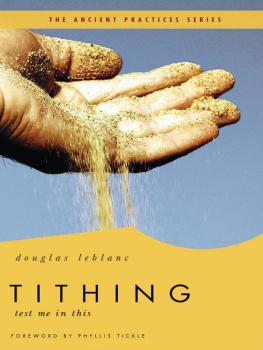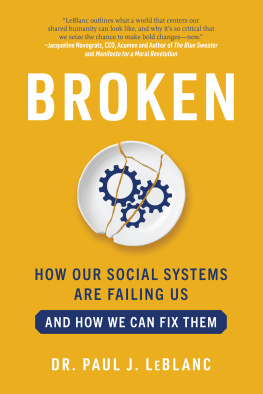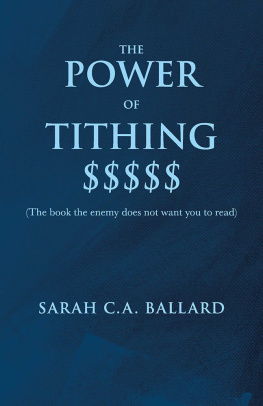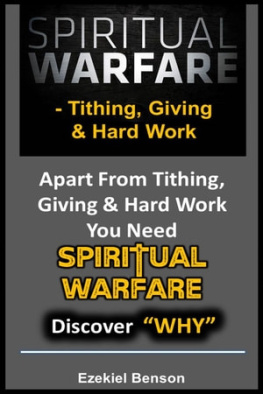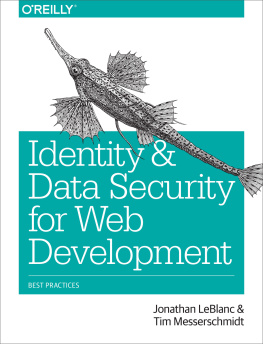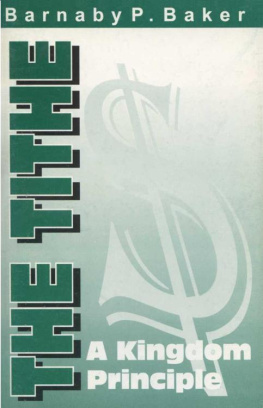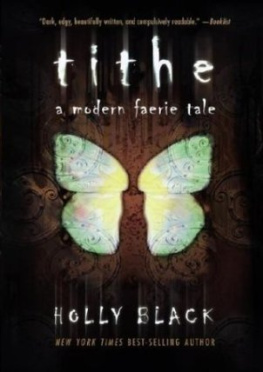
PRAISE FOR TITHING
Doug LeBlancs collection of profiles of tithers will open your eyes to how giving can be a practice that shapes rather than an obligation that weighs. Along the way, it also breaks down stereotypes of what kind of person tithes. Rather than teaching or preaching stewardship, this book lets givers from across a wide theological spectrum tell their own stories. Their motivations turn out to be as diverse as their backgrounds, and equally varied are the fruits the discipline bears in their lives. If you have not yet tested God in this, you may find yourself intrigued enough by their stories to try.
Rev. Beth Maynard
Editor, Get Up Off Your Knees: Preaching the U2 Catalog
Which of the following best describes a person who tithes: a conservative evangelical, an Episcopal priest, a progressive activist, a pacifist, a Roman Catholic monsignor, a black church pastor, an Eastern Orthodox author, or a Seventh-day Adventist convert from Judaism? Answer: all of the above, of course! Douglas LeBlancs book explodes stereotypes and demonstrates that tithing has a way of reordering our priorities so that our focus is not on the issues that perpetually divide us but on giving back to the God who gave everything to us in Jesus. These are inspiring, often surprising stories of Gods grace at work in unlikely people, unexpected places, and extraordinary ways. At the same time, they prove that the discipline of tithing isnt just for the super-spiritual: its something we are all called to do.
Fr. Nathan J.A. Humphrey
Editor, Gathering the Next Generation: Essays on
the Formation and Ministry of GenX Priests
TITHING
Test Me in This
Douglas LeBlanc
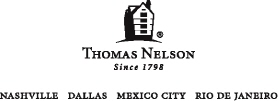
2010 by Douglas LeBlanc
All rights reserved. No portion of this book may be reproduced, stored in a retrieval system, or transmitted in any form or by any meanselectronic, mechanical, photocopy, recording, scanning, or otherexcept for brief quotations in critical reviews or articles, without the prior written permission of the publisher.
Published in Nashville, Tennessee, by Thomas Nelson. Thomas Nelson is a trademark of Thomas Nelson, Inc.
Thomas Nelson, Inc., titles may be purchased in bulk for educational, business, fund-raising, or sales promotional use. For information, please e-mail SpecialMarkets@ThomasNelson.com.
All Scripture quotations, unless otherwise indicated, are taken from the HOLY BIBLE: NEW INTERNATIONAL VERSION. 1973, 1978, 1984 by International Bible Society. Used by permission of Zondervan Publishing House. All rights reserved.
Scripture quotations marked KJV are taken from The King James Version of the Bible. Public domain.
Scripture quotations marked NRSV are taken from the NEW REVISED STANDARD VERSION of the Bible. 1989 by the Division of Christian Education of the National Council of the Churches of Christ in the U.S.A. All rights reserved.
Scripture quotations marked NASB are taken from the NEW AMERICAN STANDARD BIBLE, The Lockman Foundation 1960, 1962, 1963, 1968, 1971, 1972, 1973, 1975, 1977, 1995. Used by permission.
ISBN 978-0-8499-4608-0 (trade paper)
Library of Congress Cataloging-in-Publication Data
Tithing : test me in this / [compiled by] Douglas LeBlanc.
p. cm.
Includes bibliographical references.
ISBN 978-0-8499-0095-2 (hardcover)
1. Christian giving. 2. Tithes. 3. United StatesReligious life and customs. I. LeBlanc,
Douglas.
BV772.T58 2009
248.6dc22
2009031702
Printed in the United States of America
10 11 12 13 14 RRD 9 8 7 6 5 4 3 2 1
In honor of my father
CONTENTS
Gregory and Frederica Mathewes-Green
Ron and Arbutus Sider
Jerry and Stacy Kramer
John Schwiebert
Randy Alcorn
Jerald January
Kevin Jones
Mark Kellner
Ed Bacon
Yisroel Miller
John and Sylvia Ronsvalle
Thomas McGread
I THANK MY FRIENDS DAVID HANDY, TREVA HOUSER, Michael Noyes, Phoebe Pettingell, Vernon Plack, Tim Ridolfi, and David Virtue for their regular questions and encouraging words about my progress toward a complete manuscript.
The warmth of a dinner conversation with Jon Sweeney helped me form a vision for in-person interviews with the tithing believers I write about in this book.
Steve Levin of the Pittsburgh Press-Gazette helped me find Rabbi Yisroel Miller. Lee Penn helped me find John Schwiebert and, like other friends, asked about the book regularly.
Maren Tompkins of All Saints Episcopal Church, Pasadena, and Kathy Norquist of Eternal Perspective Ministries coordinated busy calendars and never lost patience with my requests for help.
My parish priest, Charles Alley of St. Matthews Episcopal Church, Richmond, offered gentle accountability, empowering prayer, and helpful responses to my draft chapters.
My wife, Monica, blessed my decision to set aside other freelance writing and concentrate on this book for a season. At too many points in our marriage, Monica graciously has allowed my editorial passions to diminish our financial security. She also found important relevant passages for the introduction. I am humbled by her generous love.
The seven ancient practices of the faith were once called the seven ancient disciplines; but times change, and words change with them. The notion of discipline fell out of favor over the years, practices seeming more voluntary and therefore less foreboding. By any name, however, the seven come into the life of faith as means of monitoring or directing both the workings of the physical body and the passage of time. Three of the sevenfasting, the sacred meal, and tithinggovern the body, its product and its appetite. The other fourthe keeping of the hours, the hallowing of the Sabbath, the observance of the liturgical year, and the making of pilgrimagegovern or give contour to the passage of time.
Of the seven, only two seem to most of us to be awkward or, perhaps, even a bit beyond the pale. That is, fasting and tithing seem somehow more private than do the other fiveless subject to conversation and easily more subject to omission, even by the devout. Of that pair, tithing is most assuredly the more difficult to discuss; yet ironically, it and the sacred meal were the first of the seven given us to observe. Like the sacred meal, tithing was established so early in our story that Abram, from whom the first tithe was taken by the Melchizedek, was still Abram and not yet renamed as Abraham. Centuries later, Christian theology was destined to make much of that fact, St. Paul arguing that Levi and all the priestly line had themselves paid tithes when they were still in the loins of their father, Abraham.
Regardless of how old or how embroidered its history among us is, however, we Christians tend to bristle or resist or retreat when we are instructed by our clergy or our theologians in the requirement laid upon us to tithe. The instinctive reaction is that the organization, whatever the organization is in our particular case, only wants our money, and that any concern for the spiritual benefits of the tithe is purely secondary, if not tertiary. Beyond that, and assuming that some of us do surmount that line of instinctive resistance, there is the nagging sense that tithing is legalisticfar more legalistic, in fact, than are any of the other six. It seems, in our post-Reformation minds, to be part of an old order, something that should have passed on with the coming of New Testament grace.
Next page
